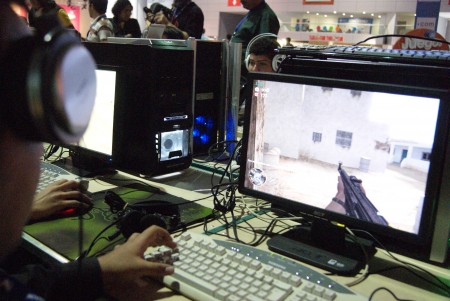
This article was originally published by Strife on 12 June 2014.
Storytelling is a core part of how we communicate with each other, understand complex issues and come to terms with the world around us. The prevalence of so-called ‘talking therapies’ show that such processes are important in helping to overcome and move past negative events and experiences. The experience of 9/11 left long-lasting and deep collective and cultural damage on the US/Western collective psyches. The ‘War on Terror’ has been compared to what Vietnam was for Lyndon Johnson: ‘a vast, tragic distraction in which he must be seen to be winning, lest the domestic agenda he really cares about be derailed.’ Popular culture, in this case Western-developed video/computer games, have become a medium in which the cathartic and curative process of storytelling is taking place on a cultural level, to move past and overcome both of these ‘unfinished’ conflicts.
War and conflict have been staple thematic topics in games for decades, as far back as Space Invaders and Missile Command in the late 1970s. However, the games released after 9/11 show an interesting pattern indicating a marked swing in direction and focus. Between 2002 and 2005 there were two games released that were set during the first Gulf War (Conflict: Desert Storm I & II), at least nine games released set during the Vietnam War (Vietcong, Vietcong 2, Battlefield: Vietnam, Conflict: Vietnam, Shellshock: ‘Nam 67, Wings over Vietnam, Platoon, Men of Valor, Line of Sight: Vietnam) as well as many more set in the modern day in real or analogous Middle-Eastern theatres. One of the most stand-out titles from this period was America’s 10 Most Wanted, whose finale consists of the player fighting Osama Bin Laden in hand-to-hand combat, and subsequently bundling him into a helicopter that flies off into the sunset while the credits roll. From this period mainstream game development began to shift to reflect changing current events. From 2008 games in this thematic field have often adopted Private Military Contractors in both pro and antagonistic roles. after the details of Blackwater’s/Xe’s involvement in Iraq became wider public knowledge and a hot topic of the time.
The ability of popular culture to serve as a space for cultural catharsis and as a coping mechanism isn’t a new one; after the collective cultural trauma of Vietnam a similar process of mourning and understanding took place. The trajectory of tone and content in the ‘war is hell’ films from the 1970s such as Apocalypse Now and The Deer Hunter shifted dramatically to the restorative and cathartic films from the 1980s like Top Gun and Rambo. These films either painted the US military in a far more positive and victorious light or, in the case of Rambo, literally re-fighting Vietnam on-screen.

